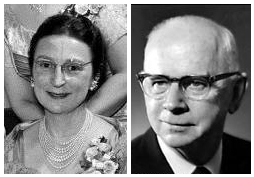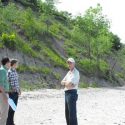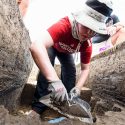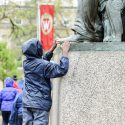Baldwin grants awarded to 18 projects
Projects both large and small will help the university contribute knowledge and resources across the state, thanks to grants from the Ira and Ineva Reilly Baldwin Wisconsin Idea Endowment.
The competitive grant program is open to UW–Madison faculty, staff and students.
Ira Baldwin, a longtime UW teacher, researcher and administrator, served as dean of the Graduate School and the College of Agriculture and as vice president for academic affairs. Ineva Reilly Baldwin taught and served in the university administration as assistant dean of women and associate dean of the College of Letters & Science. Their endowment is one of the largest gifts ever received by UW–Madison.

Ineva Reilly Baldwin and Ira Baldwin.
This year, eight grants were awarded as well as 10 mini-grants encouraging innovation and experimentation in small-scale projects.
The eight grants are, as described in their submissions, are:
The Lands We Share Community Engagement Initiative (WI Farms Oral History Project), Troy Reeves, UW–Madison Libraries/Archives and James Levy, History
The Lands We Share initiative seeks to use Wisconsin’s rich agricultural history and statewide cross-cultural connections to land and farming as the basis for a three-phase, twenty-month pilot project supporting community dialogue in three Wisconsin locations: Milwaukee County, Jefferson County in southeast Wisconsin, and several counties comprising northeast Wisconsin (the Oneida, Oshkosh and Green Bay region). The initiative involves the development of a traveling multimedia pop-up exhibit and companion web tool to support, structure, capture and ultimately disseminate six community conversations (two each in each of the three regions).
Do You Play Fair? Addressing Bias in K-12 Educational Settings, Christine Pribbenow, WCER and Molly Carnes, SMPH
Significant disparities continue to exist between black and white students in education. Recently, differential treatment of students due to unconscious cognitive processes, “implicit bias” has been identified as a contributor to negative experiences and outcomes for underrepresented minorities. Perspective-taking — or “imagining yourself in someone else’s shoes” — helps to decrease implicit bias and in turn, promotes positive feelings, attitudes and behaviors toward others. The proposed project builds upon the success of the Fair Play game, which was developed to provide players with the opportunity to take the perspective of a Black student who encounters bias incidents on a university campus as well as workshops that are currently being offered at UW–Madison and other postsecondary institutions The project will create a professional development tool that is based in a K-12 school context that will allow teachers and administrators to take the perspective of students with whom they work. Ultimately, this game will be available for use by districts across the state of Wisconsin.
Expanding student investigative reporting to the borders of Wisconsin, Hemant Shah, School of Journalism & Mass Communications
The nonprofit, nonpartisan Wisconsin Center for Investigative Journalism is housed in the School of Journalism & Mass Communication. Over the past seven years, journalism students under the management of the Center have created investigative reports on issues of crucial importance to Wisconsin, including human trafficking, the law treating 17-year-old offenders as adults, the high suicide rate among Native Americans, contamination in the state’s drinking water and a policy that denied vocational training to thousands of disabled Wisconsin residents.
In the tradition of the Wisconsin Idea and its service learning mission, Baldwin funding will help SJMC and the Center turn 10 to 12 student investigations a year into impactful reports seen across the state on issues of public importance, often benefitting some of Wisconsin’s most vulnerable residents. The Center’s stories, which are distributed for free, have been used by about 350 news outlets reaching an estimated audience of 46 million since 2009.
Faith and Community in Action: Increasing Awareness and Management of Depression in African-American Communities; Earlise Ward, School of Nursing and Pastor Anthony Wade, Second Baptist Church and Centers for Disease Control
The African-American Council of Churches (AACC) in Dane County, an association of Christian congregations in greater Madison, Wisconsin, will partner with Professor Earlise Ward, School of Nursing, to develop a community faith-based depression class that will involve 50 African-American clergy and 24 African-American women (age 50 and older) to address depression in the African-American community. Outcomes will focus on implementation strategies, increased knowledge of depression, healthier coping behaviors, and satisfaction. This project draws on Dr. Ward’s scholarship on depression among African-American women and is consistent with the Wisconsin Idea — putting research into practice in our community. Plans include providing information to guide implementation and sustainability strategies to support dissemination in Racine, Milwaukee and Beloit in the near future.
Getting Veterans Back to Work: Transitional Vocational Training in Facilities Operations, Susan Fritts, Facilities Planning & Management and Kris Ackerbauer, Physical Plant
This new project is a partnership between UW Facilities Planning & Management (FP&M) and the US Department of Veterans Affairs (VA) Compensated Work Therapy (CWT) Transitional Work (TW) program to place qualifying veterans in temporary labor positions to provide transitional vocational training as a gateway to permanent employment. Temporary placements, which typically last three to six months, will address crucial skills gaps and provide on-the-job, vocational training in facilities operations, including the use of specialized equipment and processes, that will leave veterans with the transferable skills they need to re-enter the workforce. This project also aims to provide both staff and policymakers at the VA and within FP&M with information about how to increase the overall success rate for veterans who are assigned temporary placements when compared to local and national data.
Image Analysis App for Corn Silage Producers, Rebecca Willett, Electrical and Computer Engineering and Brian Luck, Biological Systems Engineering
This proposal describes a novel effort to develop a smartphone app that can be used by Wisconsin farmers to monitor and adjust the processing of corn silage during harvest. Corn silage must be produced to meet essential criteria that ensure subsequent proper livestock nutrition. However, sending silage samples to a remote laboratory for analysis of these criteria is time consuming, and typically the lab analysis is not received until after the harvest is complete, when it is too late to make adjustments. The proposed app leverages methods from signal and image processing and machine learning to automatically evaluate silage samples based on a smartphone photograph, providing farmers with immediate feedback that they can use to adjust their forage harvesting equipment, on a field-by-field basis if desired. The investigators will also produce a UW Science Narrative video that describes the app and its utility both to farmers and the broader Wisconsin population.
Madison Street Medicine Initiative, Ann Catlett, Department of Medicine
Madison Area Care for the Homeless (MACH) OneHealth is the only local community organization whose mission it is to provide and coordinate compassionate, holistic healthcare for housing insecure individuals in the Madison Area.The Madison Street Medicine Initiative (MSMI) will utilize medical expertise and UW-associated providers in combination with the community connections of MACH activists to design and implement the first “street medicine” and advocacy project in Madison. Services will be provided initially on street rounds then later in settings across the continuum of care. Since its start MACH volunteers have effectively run a new clinical program, linked with existing services and agencies, retained roughly 15 dedicated health care providers who serve at Foot Care Clinic, and recruited an additional 76 providers who, when surveyed, indicated an interest in participating in outreach and advocacy activities for persons experiencing homelessness. In terms of capacity and community need, it is an opportune time for expansion of MACH services. Funding via the Baldwin grant will enable the PI to use medical expertise in collaboration with grassroots energy to take an essential step toward reducing gaps in health service for the homeless.
Translational data-rich journalism for the people: a partnership of UW–Madison’s Applied Population Laboratory and WisContext, a multimedia news outlet, Malia Jones, Community and Environmental Sociology
This project’s vision is to deliver on the Wisconsin Idea by fostering public engagement with groundbreaking UW–Madison social science research and data on critical social issues affecting Wisconsin today. To achieve this vision, we propose to serve timely, issue-focused social science research to Wisconsin residents in a popular news media format. The specific goal of this project is to bridge the gap between campus social science research and the public by presenting scientific perspectives on social issues to Wisconsin-based lay audiences in an internet-first, graphical-and-text news format, with support from radio and television news. We propose to create and publish a total of 54 graphics- and data-rich grounded news pieces on social trends aimed at lay audiences in Wisconsin, with a special focus on reaching younger adult audiences. We will organize the content of reports around five key social issues affecting Wisconsin residents: health and health disparities, rural life, the electorate, aging, and jobs. This is a partnership between the Applied Population Laboratory (APL), a respected multidisciplinary research/outreach social science group on the UW–Madison campus, and WisContext, a digital news provider, a broadcast partnership of Wisconsin Public Radio and Television and UW Extension, and a syndication platform. This partnership and project draws on the immediacy of public radio journalism, the longer form journalistic story-telling of public television and the potential for graphical presentation of data-rich stories via web-based interactive media. It leverages the deep knowledge base of our University to empower Wisconsin residents through greater understanding of complex and timely social issues, promote a more engaged populace and achieve the Wisconsin Idea.
Read about the 10 mini grants awarded here.



